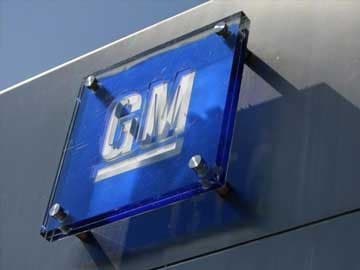
The General Motors logo is seen outside its headquarters at the Renaissance Center in Detroit, Michigan in this file photo
Detroit:
General Motors Co, already locked in a public relations crisis because of a deadly ignition defect that has triggered the recall of 2.6 million vehicles, has a new perception problem on its hands.
The US company is now considered the worst big automaker to deal with, according to a new survey of top suppliers to the car industry in the United States.
The annual survey, conducted by the automotive consultant group Planning Perspectives Inc, asks the industry's biggest suppliers to rate their relationships with the six automakers that account for more than 85 percent of all light vehicle sales in the United States.
Those so-called "Tier 1" suppliers say GM is now their least favorite big customer, according to the rankings, less popular even than Chrysler, the unit of Fiat Chrysler Automobiles, which since 2008 had consistently earned that dubious distinction.
Suppliers gave GM low marks on all kinds of key measures, including its overall trustworthiness, its communication skills, and its protection of intellectual property.
The suppliers also said that GM was the automaker least likely to allow them to raise prices to recoup unexpected material cost increases.
"As a result, GM is now the least preferred customer of suppliers," PPI says.
Nissan Motor Co Ltd overtook Ford Motor Co for third place in PPI's Supplier Working Relations Index, pushing Dearborn-based Ford into fourth place. Toyota Motor Co and Honda Motor Co Ltd finished in the No. 1 and No. 2 spots, respectively.
PPI, which has been conducting the survey for 14 years, says supplier perceptions of automakers are critical because they can determine which car makers see the suppliers' newest technologies first, get their best pricing and work with their best engineers.
John Henke, the head of PPI and a research fellow at Center for Supply Chain Management at Rutgers University, said the Japanese sweep of the top three places suggested the industry "could be entering an era in supplier relations that doesn't bode well for the U.S. Big Three."
The reason: the Japanese automakers are not just benefiting from a deterioration in relations between suppliers and the Big Three -- they are actually rising in the estimation of their suppliers.
Toyota and Nissan, in particular, saw the percentage of suppliers who characterized their relationship with the two automakers as "good or very good" surge.
GM, meanwhile, is in an especially unenviable spot, with 55 percent of the suppliers surveyed characterizing their relations with the automaker as "poor to very poor," up from 48 percent last year.
One bit of good news for GM. When the list of car makers was expanded to include the three German auto companies, which have a far less significant market share in the U.S., suppliers said Daimler AG's Mercedes-Benz and Volkswagen AG were even harder to deal with.
But because BMW ranked second in the expanded list, just below Toyota but ahead of Honda, GM's overall position fell to seventh place in the supplier's best/worst rankings.
The US company is now considered the worst big automaker to deal with, according to a new survey of top suppliers to the car industry in the United States.
The annual survey, conducted by the automotive consultant group Planning Perspectives Inc, asks the industry's biggest suppliers to rate their relationships with the six automakers that account for more than 85 percent of all light vehicle sales in the United States.
Those so-called "Tier 1" suppliers say GM is now their least favorite big customer, according to the rankings, less popular even than Chrysler, the unit of Fiat Chrysler Automobiles, which since 2008 had consistently earned that dubious distinction.
Suppliers gave GM low marks on all kinds of key measures, including its overall trustworthiness, its communication skills, and its protection of intellectual property.
The suppliers also said that GM was the automaker least likely to allow them to raise prices to recoup unexpected material cost increases.
"As a result, GM is now the least preferred customer of suppliers," PPI says.
Nissan Motor Co Ltd overtook Ford Motor Co for third place in PPI's Supplier Working Relations Index, pushing Dearborn-based Ford into fourth place. Toyota Motor Co and Honda Motor Co Ltd finished in the No. 1 and No. 2 spots, respectively.
PPI, which has been conducting the survey for 14 years, says supplier perceptions of automakers are critical because they can determine which car makers see the suppliers' newest technologies first, get their best pricing and work with their best engineers.
John Henke, the head of PPI and a research fellow at Center for Supply Chain Management at Rutgers University, said the Japanese sweep of the top three places suggested the industry "could be entering an era in supplier relations that doesn't bode well for the U.S. Big Three."
The reason: the Japanese automakers are not just benefiting from a deterioration in relations between suppliers and the Big Three -- they are actually rising in the estimation of their suppliers.
Toyota and Nissan, in particular, saw the percentage of suppliers who characterized their relationship with the two automakers as "good or very good" surge.
GM, meanwhile, is in an especially unenviable spot, with 55 percent of the suppliers surveyed characterizing their relations with the automaker as "poor to very poor," up from 48 percent last year.
One bit of good news for GM. When the list of car makers was expanded to include the three German auto companies, which have a far less significant market share in the U.S., suppliers said Daimler AG's Mercedes-Benz and Volkswagen AG were even harder to deal with.
But because BMW ranked second in the expanded list, just below Toyota but ahead of Honda, GM's overall position fell to seventh place in the supplier's best/worst rankings.
© Thomson Reuters 2014
Track Latest News Live on NDTV.com and get news updates from India and around the world

